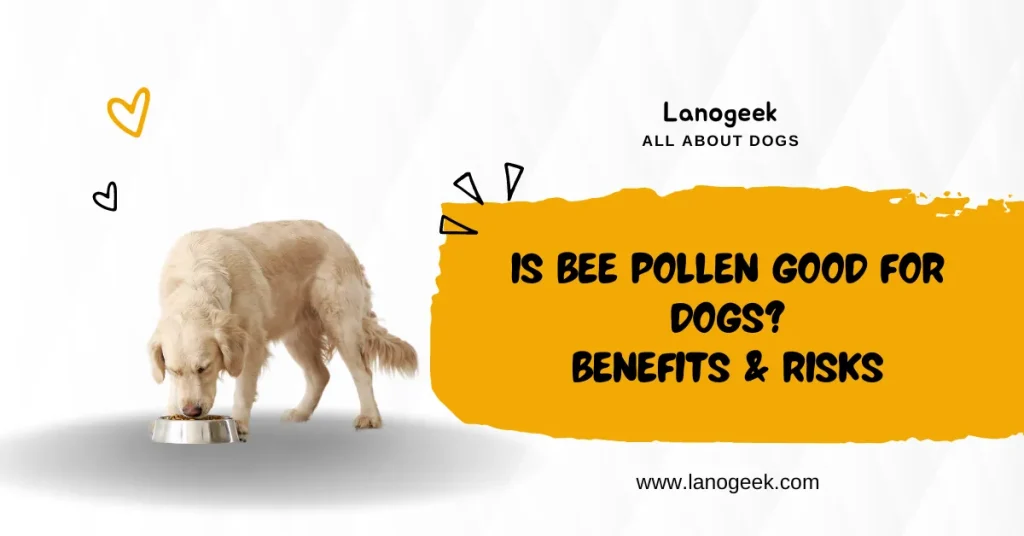Is bee pollen the secret ingredient missing from your dog’s diet? Packed with essential nutrients, bee pollen act as a potent superfood offering many benefits for our canine companion. In this guide, I will tell you about the transformative potential of it, exploring how its rich composition of simple sugars, protein, vitamins, minerals, and fatty acids can help your dog’s well-being.
Recent read: Can Dog Eat Goji Berry?
At the heart of our exploration lies the remarkable ability of bee bread to alleviate allergic reactions in dogs and humans alike. From reducing inflammation to enhancing vitality, this natural wonder has garnered attention for its healing properties. But that’s not all – recent research suggests that bee pollen might even hold the key to cancer prevention, offering hope in the fight against this devastating disease.
Bee Pollen Healing Potential
When it comes to enhancing your dog’s vitality and resilience, it acts as a natural powerhouse. Let me tell you how it can contribute to your dog’s overall health:
Boosting Vitality: Canine athletes and companions alike can benefit from the energy-boosting properties of this. Rich in nutrients, it serves as a potent source of strength and stamina. Whether your dog is recovering from illness or injury or simply seeking an extra edge in performance, it offers a holistic solution to elevate vitality levels.
Stimulating the Immune System: Bee pollen doesn’t just fortify your dog’s physical prowess – it also strengthens their immune defenses. With its rich antioxidants and immune-regulating compounds, it bolsters the body’s ability to fend off infections and illnesses. By giving it into your dog’s daily regimen, you’re providing them with a powerful shield against common ailments and environmental stressors.
Improving Intestinal Function: A healthy gut is essential for overall health, and ambrosia plays a crucial role in supporting digestive health. Enzymes present in it aid in food digestion and nutrient absorption, ensuring that your dog receives maximum nourishment from their meals. Additionally, it’s antimicrobial properties help maintain a balanced gut microbiome, reducing the risk of digestive disturbances and promoting optimal gastrointestinal function.
Sourcing High-Quality Bee Pollen
Ensuring the quality and purity of this is paramount to reaping its full benefits. Here’s what you need to know for sourcing top-notch for your dog:
It is gathered by worker bees from various plant sources, resulting in different compositions and qualities. Opt for bee pollen sourced from pristine environments free from pesticides and pollutants to guarantee purity and potency. Environmental factors like pesticides and heavy metals can contaminate it, compromising its quality. Choose toxin-free bee bread, preferably sourced from remote or desert areas known for their pristine ecosystems.
Not all bee pollen is created equal, so it’s essential to research and vet potential suppliers thoroughly. Look for reputable beekeepers or suppliers who prioritize quality control and ethical harvesting practices. Local sourced from nearby apiaries offers freshness and supports local beekeeping communities. Additionally, opting for organic bee pollen ensures that your dog receives a pure and uncontaminated product free from harmful chemicals.
Introducing It Into Your Dog’s Diet
Begin with a small amount, such as a single grain, and observe your dog’s reaction closely. Monitor for any signs of intolerance or allergic reaction before increasing the dosage. Slowly increase the amount of it over several weeks, allowing your dog’s system to adjust gradually. Aim for a dosage of approximately 1 teaspoon per 30 pounds of body weight per day, mixed with food. To make it more palatable, mix it with your dog’s regular food or incorporate it into homemade treats. This ensures that your dog consumes it consistently as part of their daily diet.
Bee Pollen vs Other Supplements
While it offers a wide range of health benefits for dogs, it’s essential to understand how it compares to other dietary supplements commonly used in pet care.
- Protein Content: It has a high protein content, making it an excellent natural source of essential amino acids for muscle growth and repair. Compared to traditional supplements like fish oil or glucosamine, it provides a more comprehensive nutritional profile.
- Micronutrient Density: In addition to protein, it contains a rich array of vitamins, minerals, and antioxidants essential for overall health and vitality. Unlike single-ingredient supplements, bee pollen offers a holistic approach to canine nutrition, addressing multiple nutrient deficiencies simultaneously.
- Bioavailability: Its bioavailability ensures that its nutrients are readily absorbed and utilized by the body, maximizing their therapeutic effects. Unlike synthetic supplements, which may have lower absorption rates, it delivers nutrients in their natural, bioactive form for optimal bioavailability and efficacy.
Some Safety Precautions
- Allergy Testing: Before introducing it into your dog’s diet, perform an allergy test by offering a small amount and observing for any adverse reactions. Watch for signs such as itching, swelling, or gastrointestinal upset, and discontinue use if any symptoms occur.
- Gradual Introduction: Start with a small dosage of this and gradually increase it over time to allow your dog’s system to acclimate. Avoid sudden changes in dosage or introducing large amounts of it all at once, as this may overwhelm your dog’s digestive system.
- Quality Control: Choose high-quality, toxin-free bee pollen from reputable suppliers to ensure purity and safety. Avoid products that may be contaminated with pesticides, heavy metals, or other harmful substances that could pose risks to your dog’s health.
- Consultation with Veterinarian: Before starting any new supplement regimen, consult with your veterinarian to assess your dog’s individual health needs and determine the appropriate dosage and usage guidelines. Your veterinarian can provide personalized recommendations based on your dog’s age, breed, size, and medical history.
Potential Side Effects
While it is generally safe for most dogs, there are potential side effects to be aware of.
- Some dogs may be allergic to it, experiencing symptoms such as itching, swelling, hives, or gastrointestinal upset. Monitor your dog closely for any signs of allergic reaction and discontinue use if symptoms occur.
- Introducing it too quickly or in large amounts may cause digestive disturbances such as diarrhea, vomiting, or bloating. Start with a small dosage and gradually increase it over time to minimize the risk of gastrointestinal upset.
- It may interact with certain medications, particularly blood thinners or medications metabolized by the liver. If your dog is taking any medications, consult with your veterinarian before introducing it to avoid potential drug interactions.
- It may contain traces of pollen from various plant sources, which could trigger allergic reactions in sensitive dogs. Choose bee pollen sourced from known allergen-free plants or perform an allergy test before introducing it to your dog’s diet.
Conclusion
In conclusion, bee pollen emerges as a versatile supplement for enhancing your dog’s health. From boosting vitality and immune function to supporting digestion and overall wellness, it offers a great approach to canine nutrition. By sourcing high-quality, introducing it gradually into your dog’s diet, and observing safety precautions, you can harness the healing potential of this natural superfood and promote your dog’s optimal health from the inside out. Consult with your veterinarian to develop a tailored supplementation plan that addresses your dog’s unique needs and maximizes the benefits of it. With bee pollen as a cornerstone of your dog’s wellness routine, you can ensure they live a vibrant, happy, and healthy life for years to come.






